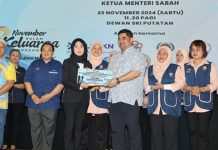KOTA KINABALU: When Covid-19 first landed in Malaysia on 25th January.2020, Malaysian politicians were busy with political games over the Prime Minister candidate, failing to address the pandemic in time, causing Covid-19 to spread.
Not until the political situation stabilized in March, the first MCO was implemented by Prime Minister, Tan Sri Muhyiddin Yassin. The pandemic was then brought under control significantly. Unfortunately, Sabah was forced to face a snap election in September, infections spread and the pandemic became worse.
Different walks of life and industries have different reactions to MCO, be it praises or criticisms. MCO 1.0 restricted all Malaysians to stay at home, allowing only essential services such as daily necessities, food stores, logistics, telecommunications, utilities, and petrol stations to operate with limited hours. Soon after, many businesses that did not fall under the list of essential services, and consumers who required diversified services, began to demand relaxation on lockdown restrictions. This phenomenon has always existed since MCO 1.0, CMCO, and RMCO up till today’s MCO 2.0.
In summary, the people have two main opinions: firstly, those with better financial circumstances tend to support stricter control; on the other hand, business owners tend to demand restrictions to be relaxed because they are still obliged to pay their employees’ salaries even though they have low or almost zero income. These contradicting views have always existed since day one until MCO 2.0.
From the government’s perspective, there are two aspects to be considered – to fight the pandemic and the country’s economy. Even if the number of positive cases continues to fluctuate, the business’ difficulties are not unreasonable. Therefore, it is important to balance between health and economy during MCO. Thus, the implementation of MCO 2.0 was criticized and called “alang alang”.
When the effort to combat the pandemic was increased, many people called for easing of the restrictions, and of course, opposition parties rode on the bandwagon too. However, when the restrictions were relaxed, many people of opposing stands were dissatisfied and the opposition parties also conveniently blamed the inability of the government in handling the crisis. The opposition parties’ ambiguous stand indirectly increased the burden of the joint efforts by government officials and citizens to fight the pandemic effectively.
The general public, like you and I, are key to fighting the pandemic. The responsibility lies on us, heavily. It is up to us whether to join gatherings or not. Further, all walks of life have their reasons regarding business continuity during MCO. Whether or not a business is allowed to open is up to the professional judgment of the Sabah State Disaster Management Committee and the local authorities.
The people need to take care of personal and family hygiene, maintain social distancing, wear masks when out in public and wash hands frequently. What we must do is be responsible and disciplined by avoiding the 3Cs, and practice the 3Ws.
We have to join forces to fight the pandemic for each other’s sake. So long as you and I are vigilant in fighting the pandemic, we will be able to help everyone. A small step for us is equivalent to a huge step in fighting the pandemic.
By Yong Yit Jee
Member, Sabah Progressive Party (SAPP) Supreme Council
cum Lawyer.






